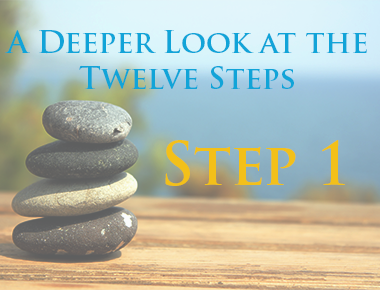
A Deeper Look at the 12 Steps: Step 1
Understanding the 12 Steps

Many people with addiction problems and substance use disorders find themselves in an alcohol or drug treatment center or rehab at some point, if they are so fortunate. However, this is not a universal reality and an equally large number of people don’t have access to an affordable drug rehab, so they seek the help of free support groups and programs, like Alcoholics Anonymous and Narcotics Anonymous.
It is a common misconception that completing an addiction treatment program will “fix” you, or get you well enough so that you can then go out and use substances like “normal people.” Unfortunately, this is rarely the case, and those who suffer from addiction need continuing support and structure in their lives. That’s where support through a 12-step program, like AA, is vital. Luckily, these programs are readily available and have improved the lives of people in recovery in almost every country around the world.
Despite their availability and apparent success, however, many people find themselves conflicted with the idea of joining AA for different reasons. Many people don’t like the fact that they have to label themselves as an addict or alcoholic, that they must come to terms with their powerlessness, or that they must put faith in a Higher Power. While the program is not scientifically proven, it is a fact that AA, NA, CA, and other similar programs working step-by-step to addiction management have helped millions of people.
What Is Step 1 of the 12-Step Program?

“We admitted we were powerless over alcohol—that our lives had become unmanageable.”
The first step is all about getting honest with yourself. It is said that the first step of the program is perhaps the most important step, because if you can’t admit there’s a problem, then you can’t work through that problem. This can be very difficult for a lot of people. They may have heard from friends, coworkers, or family members that they drink too much, but they can’t see for themselves how it is disrupting their lives.
No one wants to call themselves an alcoholic. No one wants to admit that they can’t control themselves, especially not when there’s already such a huge social stigma around alcoholism. Even though the American Medical Association declared that alcoholism is both a psychiatric and medical disease in 1991 and that having a parent who is an alcoholic can result in the child becoming an alcoholic in 40-60% of cases, people still believe alcoholism is a result of being weak or unable to control yourself.
Alcoholics and addicts are not bad people, they are unwell people. While the disease of alcoholism cannot be cured as of now, it can be managed and put into remission just like other deadly diseases. By admitting you are powerless over alcohol, you come to realize that there is no such thing as “controlled drinking” or being able to manage it, which ultimately leads to worse and worse consequences, and that complete abstinence is the only answer.
Ways to Follow Step 1 of the 12 Steps of Alcoholics Anonymous

It is common to feel guilt and shame when working through the first step. Many alcoholics struggle to come to terms with the fact that they have a problem and that their loved ones aren’t simply overreacting.
For those struggling to follow AA’s step one, here are a couple things to try to make the process easier:
- Regularly attend AA meetings. Realizing you are not alone and that many other people have been exactly where you are now can help make it easier to admit that you are powerless over your alcohol consumption. Listening to other AA speakers can also help relieve the guilt and shame holding you back from following AA step 1.
- Approach an addiction or alcoholism counselor. Asking for help with your alcoholism means you admit you cannot control yourself and are in a position where you can’t triumph over your addiction alone. By working with a counselor, you can find ways to come to terms with the reality of your alcoholism and better follow the principles of honesty behind step one of the 12 steps recovery program.
Once you get honest with yourself and practice acceptance that you cannot control how much you drink or drink “normally,” you can start to do the real work.
Remember, staying sober isn’t the goal, your happiness is, and getting to a point where you are truly happy in recovery will be one of the most rewarding experiences of your life.
If you or a loved one is suffering from alcohol addiction, Yellowstone Recovery can guide you towards the first step of recovery. Explore our website today to learn more about our alcohol addiction recovery program and how we can help you.








